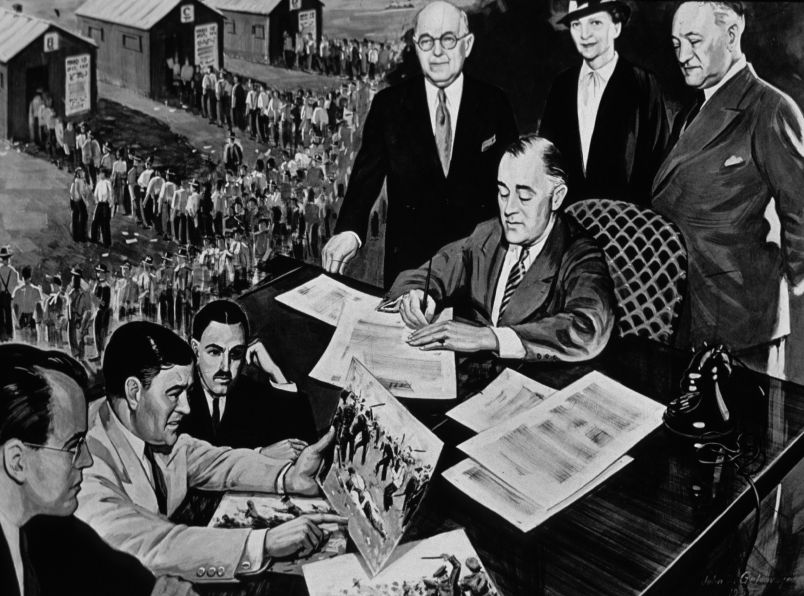When I moved to Washington, DC as a recent college graduate back in 2006, I had no intention whatsoever of working in Congress. Like most Americans, I had a profound lack of respect for the institution (Congress received an approval rating of only 18 percent in Gallup’s latest poll, and in June 2014 Americans ranked their confidence in it far lower than banks, the criminal justice system, big business, and even television news). Because I wanted to look like I was doing something with my free time while I applied for job after job at respectable organizations, I swallowed my pride and got an unpaid internship in one of my senators’ offices. I hoped that I would soon be able to drop that embarrassing mark from my resume and never mention it again.
To my surprise, a year later I had transformed into a passionate mid-level staffer on a Congressional oversight committee working with some of the most dedicated and ethical people I have ever met. Theirs is a story we hear too rarely. Yes, it’s true; there is a tiny sliver of Congress that isn’t as terrible as you think.
As an associate investigator on the Senate Special Committee on Aging, I was one of the perhaps 2 to 5 percent of Congressional staffers whose primary job function is neither creating (or more often blocking) new legislation, nor pimping the same old non-accomplishments to the press. That almost-insignificant proportion of Congressional staff is devoted instead to oversight and investigations (O&I), and they are the unsung heroes of our nation’s least respected institution. (Send some love also to the underpaid and underappreciated administrative support staff and caseworkers who help constituents deal with federal agencies’ nonsense; they are similarly undeserving of our nation’s scorn.)
O&I staffers spend their days investigating and exposing government waste, policy failures and private sector malfeasance. In short, they do absolutely everything they can to make the right kind of enemies. Before I earned my first honorary investigator’s magnifying glass à la Sherlock Holmes (yes, really), I was hooked: These were my kind of people.
These staffers are among the few in Congress who can and do actually help people in real time. They do it almost entirely through the disinfecting power of sunlight; when O&I staffers bring government scrutiny and media attention to bad actors, those bad actors often change their behavior for the better. I still savor the day I got to participate in the questioning of the CEO of a multibillion-dollar corporation in our small office, leading to his wise decision to reverse an unethical decision. As a result, that company wasn’t in the newspaper the next day and people across the country benefited from the reversed decision. Our victories may have been small, but they mattered.
Unlike many of their policy- and politics-oriented colleagues, Congressional investigators tend to far outlast their bosses, the politicians who come and go with the winds of change. Year in and year out, they work diligently and often without much in the way of thanks or financial reward. Perhaps most tellingly, it goes almost without saying that experienced O&I staffers could earn salaries several multiples higher in the private sector than their government wages allow. All they would have to do is sell their souls to any of the dozens of Beltway firms that specialize in defending big business and other special interests from government oversight, and they could quite literally be rolling in piles of cash in short order. When Congressional O&I staffers do leave their posts, it is typically to serve in other sectors of the oversight process.
Case in point: Emilia DiSanto, the chief investigative counsel for the Senate Finance Committee for several years, who is now serving as the Deputy Inspector General at the Department of State. The first time I met Emilia to collaborate on an investigation, a colleague tipped me off that in our little world, she was a living legend. One evening in 2005, as she arrived home a man dressed in black and wearing a ski mask was waiting for her. She was beaten with a baseball bat and hospitalized, receiving several stitches. The FBI investigated due to a suspicion that the attack was related to her investigations, but the case was never solved. As for Emilia? She was back at work within a week, plugging away on her investigations on our behalf.
Jack Mitchell, likewise, went from being my boss as the Chief of Investigations on our committee to serving as the Director of Special Projects at the Special Inspector General for the Afghan Reconstruction (SIGAR), currently one of the most hard-hitting oversight shops around. He learned the ropes under the Pulitzer Prize-winning investigative journalist Jack Anderson, who took pride in topping President Nixon’s enemies list. In the 1990s, he headed up the Office of Special Investigations at the FDA, taking on the tobacco industry alongside agency head David Kessler and whistleblower Jeffery Wigand. Without a doubt, Jack was the best boss I’ve ever had, and also one of the best people I’ve known. To the corrupt, however, he was and is a “scary guy.” I can think of no higher compliment.
Jack, Emilia, and any number of their fellow current or former Congressional investigators could be forgiven for selling us all out in exchange for a fat paycheck. For some unfathomable reason, they don’t. Even though we the people continue to send what seem to be the worst members of our communities to represent us there, Congressional O&I staffers continue to devote their lives to our wellbeing.
By all means, America, keep hating Congress for the cesspool that it is. But also try to remember there are people there who are fighting for us. We need more of them.
Will Kramer has been a US Senate oversight & investigations staffer, a miserable corporate drone, and an all around dirtbag trying to set things right. He is now a rogue safety consultant and writer. Reach him through Twitter: @wnkramer.









